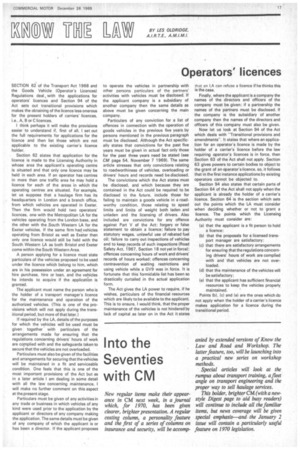ERnim 111
Page 19

If you've noticed an error in this article please click here to report it so we can fix it.
BY LES OLDRIDGE, A,I,R,T.E., A.M.I,M,1 SECTION 62 of the Transport Act 1968 and the Goods Vehicle (Operator's Licences) Regulations deal with the applications for operators' licences and Section 94 of the Act sets out transitional provisions which makes the obtaining of the licence less onerous for the present holders of carriers' licences, i.e., A, B or C licences.
I think perhaps it will make the provisions easier to understand if, first of ail. I set out the full requirements for applications for the licence and then list those which are not applicable to the existing carrier's licence holder, Section 62 states that application for the licence is made to the Licensing Authority in whose area the applicant's operating centre is situated and that only one licence may be held in each area. If an operator has centres in more than one traffic area he may hold a licence for each of the areas in which the operating centres are situated. For example, let us suppose that a haulage firm has its headquarters in London and a branch office, from which vehicles are operated in Exeter.
Then the firm would hold two operators' licences, one with the Metropolitan LA for the vehicles operating from the London base, and the other with the South Western LA for the Exeter vehicles, If the same firm had vehicles operating from Bristol as well as Exeter then only one licence would still be held with the South Western LA as both Bristol and Exeter come within the South Western Area.
A person applying for a licence must state particulars of the vehicles proposed to be used under the licence which belong to him, which are in his possession under an agreement for hire purchase, hire or loan, and the vehicles he intends to acquire if the application is granted.
The applicant must name the person who is the holder of a transport manager's licence for the maintenance and operation of the authorized vehicles. (This is one of the provisions which will not apply during the transitional period, but more of that later.) If required by the LA. details of the purposes for which the vehicles will be used must be given together with particulars of the arrangements made for ensuring that the regulations concerning drivers' hours of work are complied with and the safeguards taken to secure that the vehicles are not overloaded.
Particulars must also be given of the facilities and arrangements for securing that the vehicles will be maintained in a fit and serviceable condition. One feels that this is one of the most important provisions of the Act but as in a later article I am dealing in some detail with all the law concerning maintenance. I will make no further comment on this aspect at the present stage.
Particulars must be given of any activities in any trade or business in which vehicles of any kind were used prior to the application by the applicant or directors of any company making the application. The same details must be given of any company of which the applicant is or has been a director. lf the applicant proposes to operate the vehicles in partnership with other persons particulars of the partners' activities with vehicles must be disclosed. If the applicant company is a subsidiary of another company then the same details as above must be given concerning the main company.
Particulars of any conviction for a list of offences in connection with the operation of goods vehicles in the previous five years by persons mentioned in the previous paragraph must be disclosed. Although the Act specifically states that convictions for the past five years must be given in actual fact only those for the past three years need be stated (see CM page 54, November 7 1969). The same article stresses that only convictions relating to roadworthiness of vehicles, overloading or drivers' hours and records need be disclosed.
The convictions which the Act states must be disclosed, and which because they are contained in the Act could be required to be disclosed in the future, include those for failing to maintain a goods vehicle in a roadworthy condition, those relating to speed limits and limits of weight both laden and unladen and the licensing of drivers. Also included are convictions for any offence against Part V of the Act: forgery or false statement to obtain a licence: failure to pay statutory wages, unlawful use of rebated fuel oil: failure to carry out inspections of vehicles and to keep records of such inspections (Road Safety Act, 1967. Section 18 not yet in force); offences concerning hours of work and drivers' records of hours worked: offences concerning contravention of waiting restrictions and using vehicle while a GV9 was in force. It is fortunate that this formidable list has been so drastically curtailed in the actual application form.
The Act gives the LA power to require. if he wishes, particulars of the financial resources which are likely to be available to the applicant. This is to ensure. I would think, that the proper maintenance of the vehicles is not hindered by lack of capital as later on in the Act it states












































































